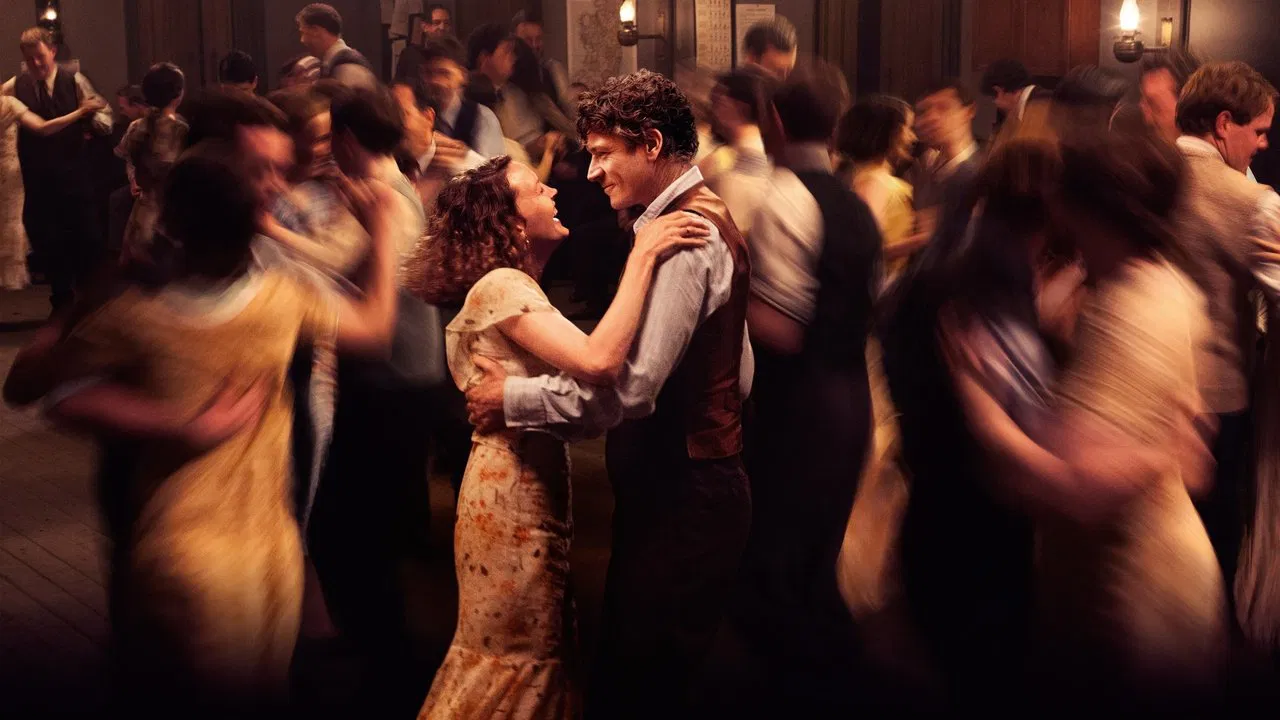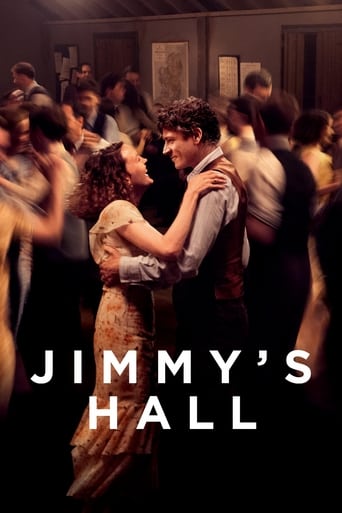

The movie Jimmy's hall is a man's fight against the authority, a man's fight to freedom. Freedom to himself and to the community. When Jimmy Gralton returns home, he found itself the same problems, wherefore to left the country many years ago. Nothing is change only the characters on the scene. The youth want to do the same things, what Jimmy and his friends did years ago. They want to be free and want to be enjoy free the dance, learning, theatre, reading. He drop in parallel events, as it happened is his youth. Jimmy tried to fight again, the power and the oppression. He see in the young people himself, that is the reason he tried to fight again. The movie is a perfect instantiated to the one man, a revolutionary battle to the totally oppression. He always hope he win, but is impossible at all. No man on earth, who can't win this kind of dictatorial power. That is the reason we can respect Jimmy Gralton, he know, in deep inside in his soul he never win, but he try and try again, when everything is seems hopeless he keep going and fight. The Jimmy's hall a great example of the man contend contra the authority.
... View MoreA film full of strong feelings between the characters. The main character is very well represented by Barry ward and pleases by the depth of ideas and emotions. It is interesting to see the discomfort of the elite and the church, so actual circumstances, although the date was the 1930s.The author makes clear in subtle and forceful way how people are prevented from living and think as they wish. This interferes in all aspects of personal life, beautifully portrayed. A great historical reference as well as a great entertainment.A beautiful movie. Photography and performances are flawless.
... View MoreFor many years now, I've been a huge fan of English filmmaker Ken Loach's work. I'm glad I read recently he's reconsidering his retirement announcement. Here, with a sharp screenplay from Paul Laverty, who often collaborates with Loach, the director presents a most powerful drama, inspired by the life of Jimmy Gralton.Set mostly during the worldwide Great Depression, Gralton is returning home to his native Ireland, after 10 years of self-imposed exile. During political unrest, and facing imminent arrest, he fled his homeland and had been living in New York City.Although a treaty has been signed following a Civil War, in Ireland, tensions remain high between various factions in the country. Amid this turmoil, Gralton, ably portrayed by Barry Ward, wants to work his family farm in peace, in County Leitrim.However, he's approached by a group of local youths who ask him to revitalize and re-open the hall he owns, which has been shut for years and is completely dilapidated. The hall used to be a vital community center for the locals, with music, dance, and various lessons being taught there.With the help of friends and the local citizens, the hall is indeed restored and brought "back to life". However, it becomes the bane of the powerful local Catholic Church, led by Father Sheridan (Jim Norton), who feels it's a threat to his authority, and the playing of such music as jazz (imported from America) is disgraceful. Father Sheridan begins to go to any lengths to disparage all the locals who go there, and brands Gralton and his friends as Communists and subversives.At the same time, powerful and rich land owners are trying to squeeze out many local farmers, by foreclosing on them without due process. The land barons, supported by the British, join with the Catholic Church and begin a campaign of violence, threats, and intimidation vs. Gralton and his many supporters.All in all, I found this latest Loach film to be impeccably directed, well written and acted by a top notch cast. Plus, we get some wonderful Irish music and dance along the way.
... View MoreIn 1933, Jimmy Gralton (Barry Ward, "Songs for Amy") became the only Irish citizen ever to have been deported from Ireland when he was exiled to America without a trial. His crime seems to be that he was a Communist who incurred the ire of the Catholic Church and the landlords by daring to establish a dance hall where such sinful pleasures as community dances, singing lessons, poetry readings, boxing lessons, and political debates took place. Written by Paul Laverty ("The Wind That Shakes the Barley") from a play by Donal O'Kelly, Ken Loach's ("The Angel's Share") Jimmy's Hall directs our attention to a not very well known incident in Irish history that followed the Civil War of 1922-23, a war waged between two groups of Irish republicans over the Anglo-Irish Treaty.Partially filmed in the village of Drumsna, a village only a few kilometers from Gralton's birthplace in Effrinagh, the film begins in 1932 with Jimmy's return to County Leitrim after having lived in New York for ten years. After showing historical footage of New York during the 1930s, particularly its poverty and unemployment during the great depression, we learn that Jimmy's brother has recently died and he is coming home to support his mother (Aileen Henry) in running the family farm. In a flashback to ten years ago, Jimmy is shown pleading with his then girlfriend Oonagh (Simone Kirby, "Season of the Witch") to go to New York with him, but she prefers to remain in Ireland. When he returns, he finds her married with two children, though they obviously still have feelings for each other. When he responds "Same as ever" to her question about how he is, she tells him that "Nobody's the same after 10 years away." Now named after Patrick Pearse and James Connolly, two martyrs of the 1916 Easter uprising against British rule,Jimmy restores the boarded-up community hall that had been closed by the Catholic Church ten years earlier, stocking it with a wind-up Victrola and jazz records he brought from New York. Once again, the hall becomes a gathering place for workers and farmers and a thorn in the side of the Church. Dances are picketed and classes disrupted, but Jimmy refuses to bend. Fearful of stoking community activism, Father Sheridan (Jim Norton, "Extremely Loud and Incredibly Close") stirs up his congregation by playing the Communist card and by warning his flock about the debasement of the country's morals."What is this obsession with pleasure?!" he demands, and asks "Is it Christ, or is it Gralton?" Railing against "the Los Angelization of our culture," the fearful pastor says that the hall has become a place where "the sins of jazz music and the rhythms from darkest Africa with pelvic thrusts may poison the minds," and reads aloud the names of those who went to the hall the previous night. Fortunately for Gralton, neither Karl Marx nor Joseph Stalin could make it. Repercussions do not take long to occur. IRA activist Commander Dennis O'Keefe (Brian F. O'Byrne, "Queen and Country") is shown whipping his daughter because hers was one of the names read aloud, shots are fired into the hall during a dance, and the hall is set on fire and burned to the ground on Christmas Eve, 1932.The best scenes in the film are Gralton's one-on-one conversations with Father Sheridan in which he reflects on the father's outward display of hatred towards those who are working towards the common good, defying Christ's message to love thy neighbor. While Sheridan is undoubtedly the villain, the intimate talks with Gralton ultimately make a dent in his intransigence and he tells his friends that Jimmy has more courage than any of them and should be treated with respect. Though his hint of transformation is aided by a young priest, Father Seamus (Andrew Scott), it is too little and too late to make a difference to Jimmy who is arrested and, deported to America where he will live out the rest of his life.Jimmy's Hall, like all of Loach's work, has its heart in the right place. It is well acted and filled with enchanting Irish folk music and high spirits, yet in sacrificing subtlety and nuance to score political points, it fails to come alive with real passion. The film does have an important message that is relevant to us in the present day where the concentration of wealth in a small percentage of the population threatens our democratic heritage, yet the characters are more cuddly than fiery, more one-dimensional symbols than fully realized human beings. In spite of the timeliness of the subject matter, Jimmy's Hall does not stir the blood.
... View More